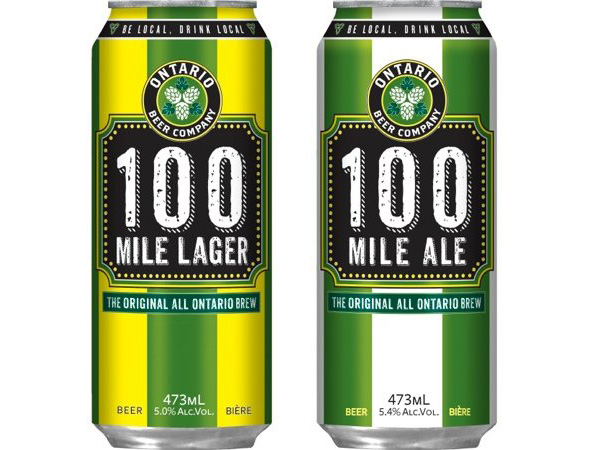 As Ontarians' beer-drinking tastes grow increasingly locally oriented and our local options for beer keep growing, it seems something like the natural progression of the province's current beer trends that a brewer would eventually go the extra step and make a beer that is not only made here in Ontario, but is also made entirely from ingredients grown right here.
As Ontarians' beer-drinking tastes grow increasingly locally oriented and our local options for beer keep growing, it seems something like the natural progression of the province's current beer trends that a brewer would eventually go the extra step and make a beer that is not only made here in Ontario, but is also made entirely from ingredients grown right here.
Well, one new brewing company has opted to do precisely that and, in doing so, The Ontario Beer Company has perhaps shown why no one else has done it thus far: it's really really difficult.
Founded by two people with some background in the province's beer-making scene, OBC is the result of a partnership between Duggan's brewery founder Mike Duggan and the guy responsible for the great beer coming out of the nano-brewery at Get Well, Brad Clifford.
The duo first met when Clifford, then a fledgling homebrewer, was a regular at Duggan's Brewery on Victoria (RIP). He started helping out around the brewhouse and actually took part in brewing an early ancestor for their beers to come when they used all Ontario malt and local hops to brew Duggan's #12, perhaps the first "all Ontario beer."
Sometime after Duggan's closed down, Clifford set up the nanobrewery at Get Well and the duo partnered up a few more times to brew an all Ontario pilsner, stout, and an ale. A commercially available all-Ontario beer was something they had discussed for a while but it took considerable planning to actually make it happen.
Most hops for Ontario beer, for example, come from the United States. Thus far, there simply isn't any one large-scale hops farmer that might reasonably produce enough of everyone's favourite member of the Cannabaceae flower family in order to brew large batches of beer. So when it came to their beer, Clifford and Duggan had to consolidate hops sources.
"The majority of the hops came from three Ontario farms," Clifford tells me. "Hugh Brown's, Heritage Hill Organics in Barrie, Daniel Sabourin's Nation Hops in St-Bernadin, and Hugo Desrochers' Tribal Hops in Iroquois." Supplying the remainder of the hops needed also required five other farms in Southwestern Ontario (all of whom are members of the growing Ontario Hop Growers Association. In total, they sourced 300 lbs of hops (dry weight) in order to brew their beer.
The next challenge came when it came time to not only harvest but to pelletize the hops. To get the hops from their flower form into the "pellets" used for brewing is a laborious process and, on a large scale, requires machinery that quite simply doesn't exist in Ontario yet.
Instead, farmer Daniel Sabourin has developed a mobile hop picker which he brought to each of the other farms to help in their harvest.
The hops were then dried and hammer milled (exactly what it sounds like) into a fine powder and vacuum sealed into bags to be used to brew.
Similarly, due to the scale of the ingredients required, most local breweries source their malted barley from Saskatchewan. Ontario grown and malted barley is available from Canada Malting Company, but when it's such a large quantity, it requires a special order and needs to be placed well in advance. (Are you starting to get why more people don't brew "all Ontario beers?")
For the sake of being thorough, I also asked Clifford to confirm that the water and yeast used were all-Ontario and, naturally, they were. The water is good ol' Lake Ontario and the yeast is from a strain that's been used in Ontario for many years.
The result is two new beers, the aptly named 100 Mile Lager, "a crisp, golden-hued, European-style lager, with a solid malt backbone and a firm, clean bitterness," and 100 Mile Ale, "a full-flavoured amber ale, with lightly toasted malt flavours, caramel and toffee notes, and a well-balanced bitterness derived from Ontario Chinook and Cascade hops."
Clifford says that the idea is to release the beer all over Ontario eventually but right now they're looking at releasing 100,000 cans of each of the Lager and Ale. You can find it in LCBOs around southwestern Ontario "ASAP"
And there are no plans for this to be a one-time release. "As hop acreage expands in later years," Clifford says, "we'll be able to produce more and make it more widely available."
"There will definitely be more," he assures me.
While the majority of the beer is being canned for the LCBOs, the Ontario Beer Company intends to have a handful of draught accounts to promote the beer and you can bet you'll find it on tap at Get Well in addition some other select Ontario Craft beer bars.
Ben Johnson also writes about beer over on Ben's Beer Blog. You can follow him on twitter @Ben_T_Johnson.
by Ben Johnson via blogTO

No comments:
Post a Comment